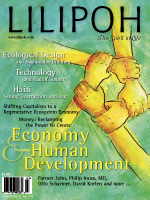Health in America: From the Vantage Point of a Holistic Physician
 By Philip Incao, MD
By Philip Incao, MD
In the April 7, 1920 lecture “"Healthcare as a Social Issue" (Mercury Press), Rudolf Steiner warned that the economic sphere must not be allowed to rule the free spiritual-cultural activity of medicine and health care. Yet today in some countries, and particularly in the US, the practice of medicine is subordinated to the business interests of the large corporations which own hospitals, which make and promote drugs and which provide health insurance.
Since Obama was elected president, these corporations have spent millions to influence the political process to make sure that any national health care “reform” would be beneficial to the profit margin of their business.
Although many Americans are in favor of the US government assuming the role of “single-payer” to cover health care costs for all citizens, this choice was never considered in Washington because it would have put all the powerful US health insurance companies out of business.
Yet experience has shown that governmental single-payer health care systems, as in Canada, Britain and France (popularized by Michael Moore’s film Sicko) are far more efficient and economical than insuring health care costs through private insurance companies.
The US health care law that was enacted by Washington in March, 2010 is unsatisfactory to many Americans on the left because it doesn’t go far enough to insure health care for all citizens, and because the law allows private, for-profit insurance companies to continue profiting from illness. (George Bernard Shaw: “Of all the antisocial vested interests, the worst is the vested interest in ill health.”) For Americans on the right and far right, this law is ideological anathema because it represents for them a “government takeover” of medicine. Despite the intense opposition of right-wing media and politicians to this health care law, most Americans welcome the fact that now they won’t be forced into bankruptcy by a serious illness or accident.
The national debate over health care reform has provoked two worrisome phenomena that are dangerous for the social health of the US. The first is the decline of the cooperative, two-party political process. This is the first major social legislation in the US that was not supported by members of both political parties. The law passed both houses of the US Congress without a single positive vote from Republican senators or representatives.
The second phenomenon is the increasing anger and hate of certain extremist groups against the government and particularly against Obama, provoked by segments of the US media. These two trends do not bode well for the future political and social health of the US.
The US spends $7290 dollars per person per year on medical care, much more than any country in the world. The next biggest spender is Switzerland, which spends $4417 (in US dollars) per person per year on medical care. Despite spending so much on health care, the average life expectancy in the US is lower than in most other developed nations and many developing nations.
One reason for this discrepancy is the lack of universal health insurance in the US. But there are more fundamental reasons, arising from the fact that the US is leading the world in developing a materialistic, reductionistic and technological approach to matters of human health and illness. At the deepest level, as Rudolf Steiner confirmed, such an approach to medicine, and to life, is fear-based. American physicians labor under the burden of two persistent fears: one, that they will make a mistake and be sued by their patient; two, that they will be punished by the medical authorities who supervise and license physicians, if they dare to depart from “accepted standards of practice.” Under the influence of these habitual fears, the US physician practices “defensive medicine,” resulting in the over-testing and over-treatment of most patients, which in turn results in endlessly increasing costs as new technology, new tests, and new treatments are developed.
The essential basis of the art and science of medicine is the physician’s devoted will to truly understand and to heal what ails his patient. Such understanding is impossible without a broader and deeper spiritual view of human destiny and of the human organism.
All physicians have a genuine desire to help their patients, but today they labor under the deception that the human body is a mechanism, and that the suppression of symptoms equates with healing. Therefore most modern physicians do not understand that suppressing an illness and healing an illness are two entirely different things. Nor do they understand that true healing is often an extended process of body/soul purification which may entail feeling worse before one feels better.
Most modern pharmaceutical drugs are effective only in suppressing symptoms and acute illnesses, often to have them reappear months or years later as acute, or worse, as chronic illnesses. Thus the more drugs are used, the more intractable illnesses become, and the more costly health care becomes. This will be a continuing global trend as long as materialism rules medicine, and such a trend is clearly unsustainable.
The way out of this dilemma lies in teaching children and adults the true meaning of health in soul and body, and in teaching them how to take responsibility for their health. This is self-knowledge at the most practical level, and to teach it is an essential part of the mission of anthroposophy, and many spiritual practices today.
